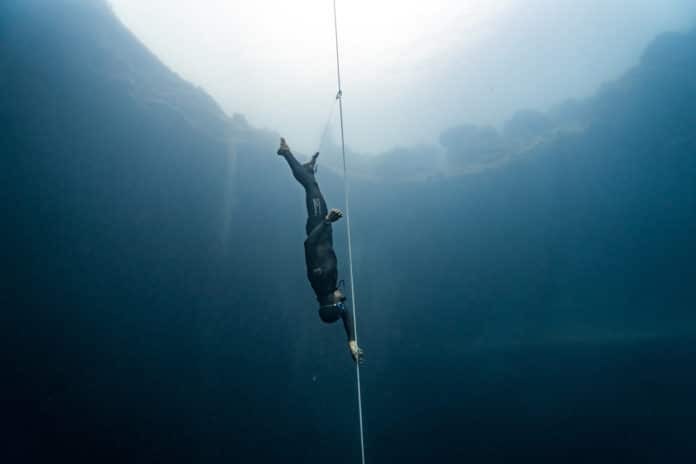If you’re a competitive freediver or spearo who likes to hunt in deep water, British National Freediving Champion Michael Board recently learned a hard lesson about making sure you’ve got a good support team and easy access to a decompression chamber if you get bent.
For the newbies reading this, yeah, freedivers can also suffer from decompression sickness.
Board, the current British Freediving record holder in the Free Immersion (FIM) and Constant Weight with Fins (CWF) disciplines, was training in Indonesia recently for this year’s world championships.
In what was planned as his last training dive before heading to Europe, Board had had a night with little sleep due to a stressful day before, but dove without incident to 107 meters/351 feet in constant weight.
Within minutes after resurfacing, though, Board began coughing up blood and feeling dizzy. Once back on the boat the DCS symptoms really kicked in, and he started breathing from an oxygen tank while he and his friends raced back to shore, during which time the O2 tank ran out.
Luckily he was able to make it to a decompression chamber in nearby Lombok, and underwent five treatments to get rid of all the symptoms. As he wrote on his Facebook page:
“So, my season has ended unexpectedly and I should probably have some further medical tests before I start any deep training again. It did highlight the importance of considering the feasibility of any evacuation plan from a dive site, and whether it will work in practice, and the possible failure points in the plan. My speedboat was recently serviced and in good working order. Lucky, as it only has one engine, and had there been an engine issue I would not have made it back. Just one example of a possible failure point, but it flagged up others. Our Oxygen supply was insufficient when I was breathing continuous flow at 25 litres/min. I had allowed the decompressing oxygen tank to get as low as 50 bar as this was plenty for post dive decompression, but it became apparent that this oxygen was also our back up emergency supply, and it was not enough for this. I had an awesome team supporting me on the day, they couldn’t have done things any better than they did. I have not always put as much thought in to who is with me when I dive deep! So many people are diving very deep now, and decompression illness may become more prevalent, so a robust evacuation plan to a hyperbaric chamber is a really important consideration, and always have the A team with you.”
Read his entire Facebook post for all the details.
(Photo credit: Daan Verhoeven)

